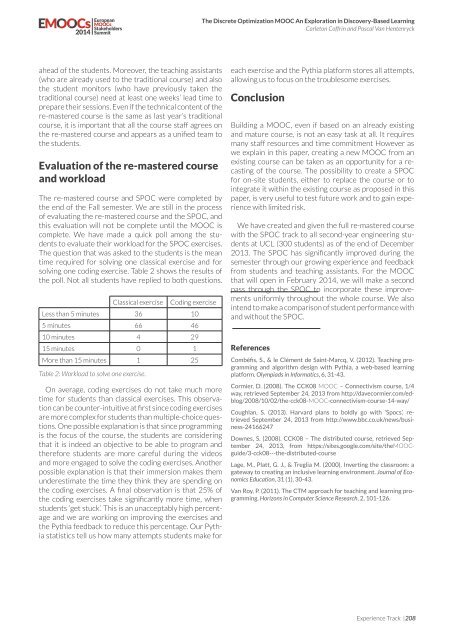zmWmQs
zmWmQs
zmWmQs
You also want an ePaper? Increase the reach of your titles
YUMPU automatically turns print PDFs into web optimized ePapers that Google loves.
The Discrete Optimization MOOC An Exploration in Discovery-Based Learning<br />
Carleton Coffrin and Pascal Van Hentenryck<br />
ahead of the students. Moreover, the teaching assistants<br />
(who are already used to the traditional course) and also<br />
the student monitors (who have previously taken the<br />
traditional course) need at least one weeks’ lead time to<br />
prepare their sessions. Even if the technical content of the<br />
re-mastered course is the same as last year’s traditional<br />
course, it is important that all the course staff agrees on<br />
the re-mastered course and appears as a unified team to<br />
the students.<br />
Evaluation of the re-mastered course<br />
and workload<br />
The re-mastered course and SPOC were completed by<br />
the end of the Fall semester. We are still in the process<br />
of evaluating the re-mastered course and the SPOC, and<br />
this evaluation will not be complete until the MOOC is<br />
complete. We have made a quick poll among the students<br />
to evaluate their workload for the SPOC exercises.<br />
The question that was asked to the students is the mean<br />
time required for solving one classical exercise and for<br />
solving one coding exercise. Table 2 shows the results of<br />
the poll. Not all students have replied to both questions.<br />
Classical exercise<br />
Coding exercise<br />
Less than 5 minutes 36 10<br />
5 minutes 66 46<br />
10 minutes 4 29<br />
15 minutes 0 1<br />
More than 15 minutes 1 25<br />
Table 2: Workload to solve one exercise.<br />
On average, coding exercises do not take much more<br />
time for students than classical exercises. This observation<br />
can be counter-intuitive at first since coding exercises<br />
are more complex for students than multiple-choice questions.<br />
One possible explanation is that since programming<br />
is the focus of the course, the students are considering<br />
that it is indeed an objective to be able to program and<br />
therefore students are more careful during the videos<br />
and more engaged to solve the coding exercises. Another<br />
possible explanation is that their immersion makes them<br />
underestimate the time they think they are spending on<br />
the coding exercises. A final observation is that 25% of<br />
the coding exercises take significantly more time, when<br />
students ‘get stuck’. This is an unacceptably high percentage<br />
and we are working on improving the exercises and<br />
the Pythia feedback to reduce this percentage. Our Pythia<br />
statistics tell us how many attempts students make for<br />
each exercise and the Pythia platform stores all attempts,<br />
allowing us to focus on the troublesome exercises.<br />
Conclusion<br />
Building a MOOC, even if based on an already existing<br />
and mature course, is not an easy task at all. It requires<br />
many staff resources and time commitment However as<br />
we explain in this paper, creating a new MOOC from an<br />
existing course can be taken as an opportunity for a recasting<br />
of the course. The possibility to create a SPOC<br />
for on-site students, either to replace the course or to<br />
integrate it within the existing course as proposed in this<br />
paper, is very useful to test future work and to gain experience<br />
with limited risk.<br />
We have created and given the full re-mastered course<br />
with the SPOC track to all second-year engineering students<br />
at UCL (300 students) as of the end of December<br />
2013. The SPOC has significantly improved during the<br />
semester through our growing experience and feedback<br />
from students and teaching assistants. For the MOOC<br />
that will open in February 2014, we will make a second<br />
pass through the SPOC to incorporate these improvements<br />
uniformly throughout the whole course. We also<br />
intend to make a comparison of student performance with<br />
and without the SPOC.<br />
References<br />
Combéfis, S., & le Clément de Saint-Marcq, V. (2012). Teaching programming<br />
and algorithm design with Pythia, a web-based learning<br />
platform. Olympiads in Informatics, 6, 31-43.<br />
Cormier, D. (2008). The CCK08 MOOC – Connectivism course, 1/4<br />
way, retrieved September 24, 2013 from http://davecormier.com/edblog/2008/10/02/the-cck08-MOOC-connectivism-course-14-way/<br />
Coughlan, S. (2013). Harvard plans to boldly go with ‘Spocs’, retrieved<br />
September 24, 2013 from http://www.bbc.co.uk/news/business-24166247<br />
Downes, S. (2008). CCK08 – The distributed course, retrieved September<br />
24, 2013, from https://sites.google.com/site/theMOOCguide/3-cck08---the-distributed-course<br />
Lage, M., Platt, G. J., & Treglia M. (2000). Inverting the classroom: a<br />
gateway to creating an inclusive learning environment. Journal of Economics<br />
Education, 31 (1), 30-43.<br />
Van Roy, P. (2011). The CTM approach for teaching and learning programming.<br />
Horizons in Computer Science Research, 2, 101-126.<br />
Experience Track |208


